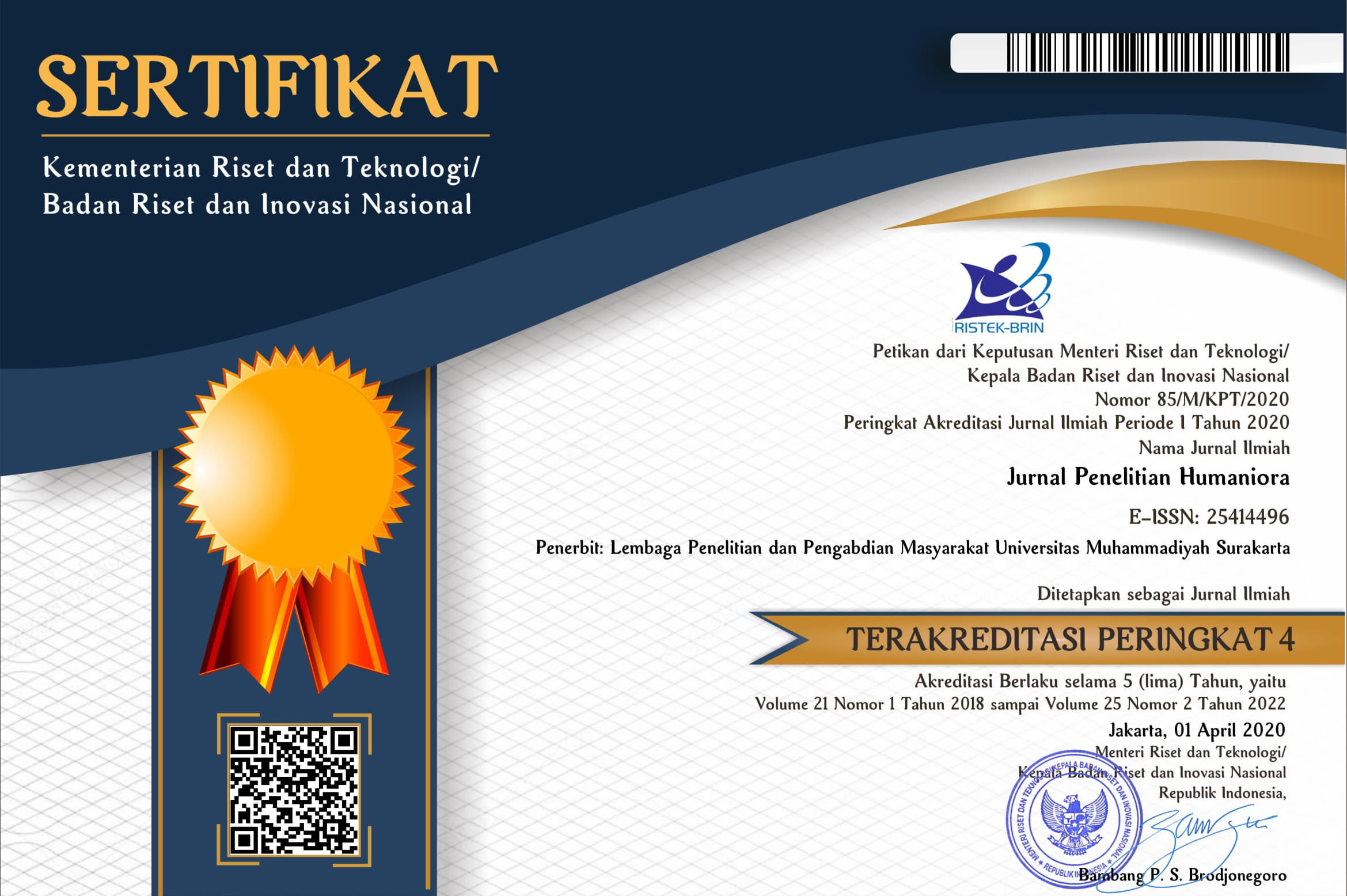CRITICAL THINKING AND ITS AFFECTING FACTORS
S Slameto(1*)(1) Universitas Kristen Satya Wacana
(*) Corresponding Author
Abstract
Keywords
Full Text:
PDFReferences
Anggraini I.S. 2016. Motivasi Belajar dan Faktor-Faktor yang Berpengaruh: Sebuah Kajian Pada Interaksi Pembelajaran Mahasiswa. Prem Educ [Internet]. 1(2). Available from: http://e-journal.ikippgrimadiun.ac.id/index.php/PE/article/download/39/37
Arends R. Classroom Instruction and Management. USA: Mc Graw-Hill Companies; 1997.
Astuti RP. 2014. Hubungan Kewibawaan Dosen Dengan Motivasi Belajar Mahasiswa Program Studi Pendidikan Agama Islam Angkatan 2009-2010 STAIN Salatiga Tahun 2013. STAIN Salatiga.
Cotton K. 1991. Teaching thinking skills [Internet]. (Northwest Regional Educational Laboratory’s School Improvement Research Series). Available from: http://www.nwrel. org/scpd/sirs/6/cu11.html9
Depdikbud. 1994. Peranan Guru dalam Peningkatan PBM dan Mutu Pendidikan. Jakarta: Depdikbud.
Edi C. 2012. Teori Belajar Berpikir Kritis [Internet]. Available from: http://ediconnect.blogspot. co.id/ 2012/03/teori-belajar-berpikir-kritis.html%09
Gokhale A. 1995. Collaborative Learning Enhances Critical Thinking. ejournals JTE. (1).
Irianti R. 2012. Prestasi Belajar Kewirausahaan ditinjau dari Persepsi Peluang Kerja dan Motivasi Belajar pada Mahasiswa FKIP Pendidikan Akuntasi Universitas Muhammadiyah Surakarta Angkatan 2008. Universitas Muhammadiyah Surakarta. Istibsyaroh A. 2017. Pengaruh Keyakinan Diri dan Pengetahuan Awal Terhadap Minat Belajar Materi Akuntansi Kelas XII SMA Negeri Di Kota Mojokerto. J Ekon Pendidik dan Kewirausahaan. 1(1).
Jalal, Fasli dan Supriadi D. 2001. Reformasi Pendidikan Dalam Konteks Otonomi Daerah. Yogyakarta: Adicita Karya Nusa.
Johari, A., Looi, C. K., Hung, D., Bopry, J., & Koh TS. 2004. Singapore’s Learning Sciences Lab: Seeking Transformations In Ict-Enabled Pedagogy. Educ Technol Res Dev. 52(4):91– 9.
Kember D. 1997. A reconceptualization of the research into university academics’ conceptions of teaching. Learn Instr. 7:255–75.
Lestari A. 2015. Pengertian Teks, Koteks, dan Konteks Serta Hubungan Ketiganya Dalam Kajian Wacana [Internet]. Available from: http://adeliahayuharuna.blogspot.co.id/ 2015/04/pengertian-teks-koteks-dan-konteks.html
Miarso Y. 2008. Peningkatan kualifikasi guru dalam perspektif teknologi pendidikan. J Pendidik Penabur. 10:66–76.
Muhtadi A. 2005. Menciptakan Iklim Kelas (Classroom Climate) yang Kondusif dan Berkualitas dalam Proses Pembelajaran. Majalah Ilmiah Pembelajaran.
Norma H. 2016. Peranan Akreditasi “A” Prodi DIII Administrasi Bisnis Terhadap Motivasi Belajar Mahasiswa Jurusan Administrasi Niaga Politeknik Negeri Sriwijaya. Politeknik Negeri Sriwijaya.
Nugraheni F. 2009. Hubungan Motivasi Belajar Terhadap Hasil Belajar Mahasiswa (Studi Kasus Pada Mahasiswa Fakultas Ekonomi UMK). Sos Budaya [Internet]. Available from: eprints.umk.ac.id
Prabowo D. 2011. Berpikir Kritis [Internet]. Available from: http://aldidoniprabowo.blogspot. com/2011/12/berpikir-kritis-berpikir-kritis-adalah.html
Purwanti, D., & Rahayuningsih S. 2012. Gambaran Motivasi Belajar Mahasiswa Pada Mata Kuliah KDPK [Internet]. Available from: static.schoolrack.com
Russell DH. 1963. The Prerequisite: Knowing How to Read Critically. Elem English. 40(6):579–97.
Sanaky HA. 2016. Paradigma Baru Pendidikan Islam: Sebuah Upaya Menuju Pendidikan yang Memberdayakan. El Tarbawi. IV:5–15.
Simpson A. 2010. Integrating Technology with Literacy: Using Teacher-guided Collaborative Online Learning to Encourage Critical Thinking. ALT-J. 8(2):119–31.
Slameto. Belajar dan Faktor-faktor yang Mempengaruhinya. Jakarta: PT Rineka Cipta; 2010.
Slamet S. 2014. Stage of Critical Thinking Abilities In Solving Mathematical Problems For Prospective Teachers Departement of Mathematics FMIPA UM Malang [Internet]. Available from: eprints.unsri.ac.id
Slameto. 2016. The Determinants of the ICT- Based O/DL Program to Encourage and Support the Country’s Economy. In: Proceeding of International Conference on Teacher Training and Education (ICTTE) FKIP UNS 2015. Surakarta: Universitas Sebelas Maret.
Sovia A. 2015. Motivasi Belajar Mahasiswa Dengan Strategi Question Student Have Disertai Pemberian Modul Pada Perkuliahan Kalkulus Vektor. J LEMMA [Internet]. 2(1). Available from: http://ejournal.stkip-pgri-sumber.ac.id/index.php/jurnal-lemma/article/ dowload/516/314
Sternberg RJ. 1986. Critical Thinking: Its Nature, Measurement, and Improvement. San Diego: Rarcourt, Brace, Jovanovich.Susanti T. 2012. Indikator Tanggap ICT [Internet]. Available from: http://susanti-vip.blogspot.co.id/2012/05/indikator-tanggap-ict.html
Tsai, C-C. & Hung C-M. 2002. Exploring Students’ Coginitiv Stucture in Learning Science: A Review of Relevant Methods. J Biol Eductaion. 36(4):163–9.
Wiggins, N.,et al. 2009. Using Popular Education For Community Empowerment: Perspectives of Community Health Workers in the Poder es Salud/Power for Health program. Crit Public Health. 19(1).
Wikipedia Bahasa Indonesia. 2016. Masyarakat Informasi [Internet]. Available from: https:// id.wikipedia.org/wiki/Masyarakat_informasi
Article Metrics
Abstract view(s): 2811 time(s)PDF: 10372 time(s)
Refbacks
- There are currently no refbacks.











